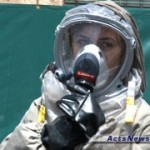As the international community debates the escalating Iranian nuclear missile crisis, Israel prepares for worst-case war scenarios.
In recent days, Israel’s Ministry of Defense, in close cooperation with the Ministry of Health, conducted drills simulating an unconventional terrorist attack – a biological outbreak of a contagious disease attacking the cities in northern Israel. Nine kilometers from Nazareth, health-care workers of Afula’s HaEmek Medical Center were drilled on their capacity to treat up to 5,000 patients per day at it’s Mass-Prophylaxis treatment center.
As part of a series of on-going drills carried out every year in Israel, the aim of the exercise was to increase the preparedness of all the relevant national services involved in CBRN Defense – chemical, biological, radiological and nuclear.
“There is a lot of talk in the media about the conflict with Iran, but Israel is quite used to such threats and such unknowns,” said Dr. Alon Erez, deputy CEO of HaEmek Medical Center. “[We] just have to be prepared for anything [because] the Middle East is a very shaky and unstable situation. Anything can happen here.”
In May of 2010, Israel’s Rambam Hospital, situated in the coastal city of Haifa, was drilled for a simulated chemical terrorist attack. The largest medical facility in Israel’s north, is also a world leader in the treatment of trauma. As a chemical attack could cause far greater numbers of casualties than conventional warfare, substantial coordination was required between military personnel, hospital staff and civilians.
“It really takes everybody … to deal with such an event including … the physicians, nurses and general people from the hospital … and the press, those who coordinate with the authorities in the city, manage the civilians, the social workers and the physical therapists. Everybody has a role,” said Prof. Dr. Raphael Beyar, director general of Rambam Health Care Campus.
And not just Israelis are taking note of the drills’ effectiveness. At both HaEmek and Rambam Hospitals an international delegation of military representatives was on-hand, making observations.
“[The exercise] is very well organized. I’m impressed,” concludes Lt. Gen. Harry M. “Budd” Wyatt III, a three-star general and director of the National Guard of the U.S. Air Force.
On the heals of the November 2011 IAEA report confirming Iran’s plans to build nuclear weapons, early 2012 will find Israelis conducting simulation drills in preparation for a radiological attack. As Iran signals its readiness for a final nuclear confrontation, Israel is sending signals of war preparedness. According to retired Lt.-Col Michael Segall, a former Israeli Defense Intelligence specialist and senior political analysis of Terrogence, today’s emerging defiant and empowered Iran can be blamed on the world’s passivity towards past Iranian acts of terrorism.

“Iran never had to pay a price … for conducting terrorist attacks in the past. Iran is taking advantage of [this],” asserts Segall. “We can see in the last month or so a growing Iranian self confidence [and] power projection. Iran is preparing for the final confrontation with the west and indeed this is the next big thing in the Middle East.”
Unknowingly, Israelis may have picked a fitting venue for a mass casualty exercise in preparation for a future worst-case war scenario. The name of northern Israel’s HaEmek Hospital in Hebrew means the valley hospital. It refers specifically to the valley of Jezreel – the place that scriptures foresee as the location of the final great battle of Armageddon.
Marney Blom is news director for the Acts News Network.
Copyright © Acts News Network, Inc.

